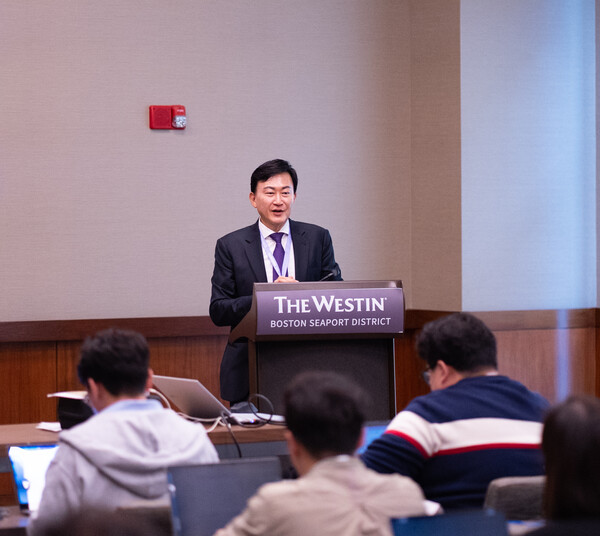BOSTON, Mass. -- By Lee Han-soo/Korea Biomedical Review correspondent -- Samsung Biologics President and CEO John Rim said the commencement date for the operation of Plant 5 has been rescheduled to April 2025, five months earlier than the initial target of September 2025.

Samsung Biologics has emerged as a leading player in the biopharmaceutical industry, achieving robust sales growth in recent years.
Since its establishment in 2011, the company has secured contract development and manufacturing organization (CDMO) contracts with 13 out of the top 20 global pharmaceutical companies.
So far, Samsung Biologics’ cumulative order value exceeded $10 billion.
In the first six months of this year alone, the company’s cumulative order value surpassed $575.1 million, thanks to new contracts and expansion of existing agreements.
Speaking at a press conference during the 2023 BIO International Convention (BIO 2023) on Monday, local time, the Korean American CEO said that the company aims for an earlier operation date in April 2025, which is five months ahead of the initial schedule.
"This decision reflects the company's proactive approach to meet the increasing demand for CDMO services and accommodate new customer contracts," Rim said.
According to Rim, the CDMO market has been experiencing substantial growth, with the demand for antibody drugs reaching new heights.
In the past three years, approximately 40 antibody-drug types have been approved in the U.S. and Europe, highlighting the expanding market for such medications.
Rim credited the remarkable reduction in the construction timeline of Plant 5 to the company's accumulated construction expertise gained from their previous four plants.
"Samsung Biologics implemented an efficient design approach called the ‘Design Cookie,’ incorporating best practices to achieve world-class construction efficiency," Rim said. "Following the completion of Plant 5, Samsung Biologics has ambitious plans for further expansion."
The company intends to establish a second bio campus in Songdo, Incheon, covering a vast area of approximately 360,000 square meters, which will house additional production facilities and an open innovation center, aiming to bolster their capabilities in the biopharmaceutical industry, he added.
Rim also said that Plant 4 has commenced full operations as of June 1, marking another milestone for Samsung Biologics.
In addition to the company's intentions to increase its capacity for biopharmaceutical production, Rim revealed plans to build a specialized production facility specifically for antibody-drug conjugates (ADCs) due to the observed growth in the ADC market.
"By proactively responding to this demand, the company aims to further enhance its position in the market," Rims said. "Investments in foundational technologies such as the recent investment Araris Biotech AG will also strengthen Samsung Biologics' production capabilities in ADCs."
The company had recently announced its investment in Araris, a Swiss-based biopharmaceutical company that develops ADC therapies and owns proprietary ADC linker technology, through the Samsung Life Science Fund – created jointly between Samsung Biologics and Samsung C&T, and managed by Samsung Ventures.
Expanding biosimilars key focus for Samsung Biologics
The CEO highlighted the forthcoming launch of Hadlima, a biosimilar of Humira, in the U.S. market scheduled for July. Organon will market the drug in the U.S.
"With the Humira biosimilar market estimated to be worth approximately 27 trillion won, Samsung Bioepis, a subsidiary of Samsung Biologics, expects significant performance synergy," Rim said. "Additionally, the company is actively pursuing the market launch of Epysqli, a biosimilar referencing Soliris in Europe."
An emphasis on sustainability
During the press conference, CEO Rim also emphasized the company's commitment to sustainability and environmental stewardship.
"Samsung Biologics is dedicated to implementing green technologies and practices throughout its operations, ensuring minimal impact on the environment," he said. "This commitment aligns with the company's broader corporate social responsibility initiatives, which aim to contribute positively to society while maintaining business growth."
As a sustainable CDMO, Rim plans to enhance the sustainability of the bio-industry and secure order competitiveness by spreading and strengthening eco-friendly actions not only in its business sites but also in its supply chain.
To achieve these goals, the company has been leading sustainability management in various fields. Such efforts include declaring net zero by 2050, joining RE100, and spearheading the supply chain sector of the Sustainable Markets Initiative (SMI), an initiative led by the British Royal Family to combat climate change.
Related articles
- [Photo News] 2023 BIO International Convention rekindling success as attendees flock back after Covid-19 pandemic
- [Special] Shaperon’s exclusive technology to fuel global expansion
- [Special] EuBiologics to spearhead ‘K-vaccine’ wave at BIO 2023
- Lotte Biologics to highlight commitment to high-quality services at BIO 2023
- [Special] Dong-A ST speeds up global entry with new drugs
- Samsung Biologics to participate in 2023 BIO International Convention
- Prestige Biopharma to attend BIO 2023
- CHA Biomedical Group seeks global biz expansion at BIO 2023
- [Special] Korean CDMO companies ready to wheel and deal at BIO 2023
- [Special] Which Korean companies will be most active at BIO 2023?
- Merck's BD team driven by science-backed data to address unmet needs
- Samyang Holdings Biopharm to open biodegradable suture plant in Hungary
- Samsung Biologics seals $411million long-term contract with Pfizer
- ‘Korea's biopharma industry needs more Innovation to stand out among competitors’
- Yuhan USA prepares for ‘next Leclaza’ in bio’s mecca of Boston
- CRO Dream CIS emerges as top helper for K-Bio’s advance to US market
- Osteoarthritis drug maker YiPSCELL met future partners at BIO 2023
- Samsung Biologics, 1st Korean firm to win ₩2 trillion in annual CMO orders
- Samsung Biologics' first-half revenue up 36% year-on-year
- Samsung Life Sciences Fund makes 1st investment in domestic biotech, AIMEDBIO

